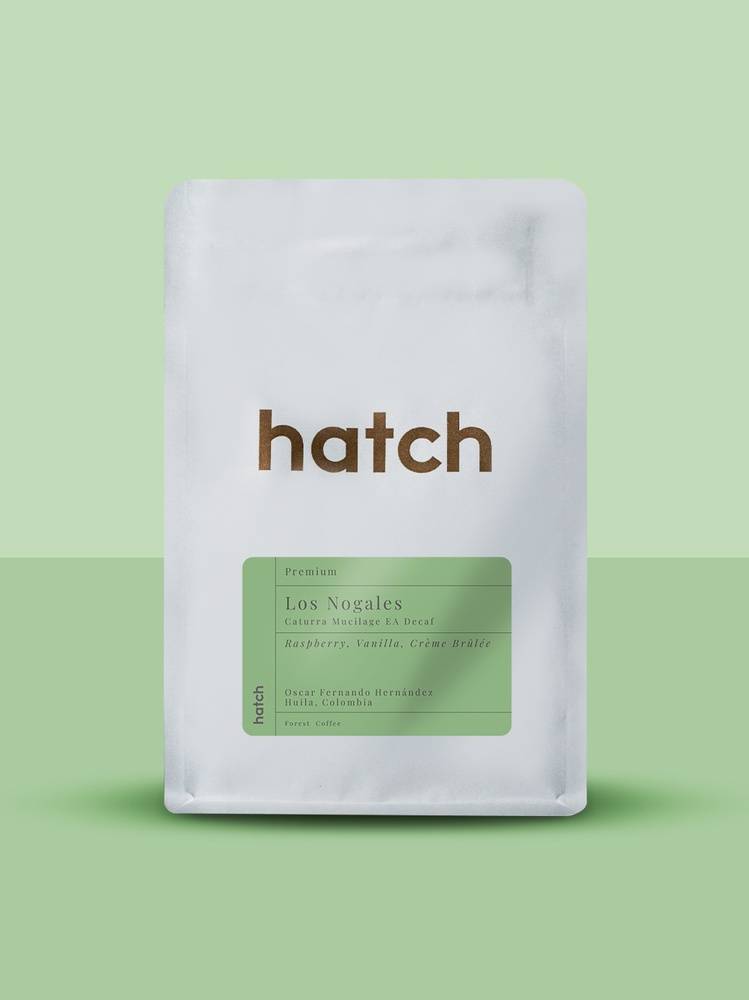HATCH COFFEE ROASTERS
HATCH - Decaf - Los Nogales Mucilage EA Decaf - Colombia - Mucilage EA Decaf - Caturra
HATCH - Decaf - Los Nogales Mucilage EA Decaf - Colombia - Mucilage EA Decaf - Caturra
Couldn't load pickup availability
| Tasting Notes: |
Raspberry, Vanilla, Crème Brûleé |
| Origin: |
Quindio, Colombia |
| Producer: |
Hernández Family |
| Process: |
Mucilage EA Decaf |
| Variety: | Caturra |
| Elevation: | 1750 - 1950 m |
| Harvest: | April - May 2024 |
| Recommended Brew: | Filter, Modern Espresso |
| Roast Date: | February 18, 2025 |
Hatch Coffee Roasters is located in Markham, Ontario, Canada
From HATCH
A new way of achieving decaf! When we first heard about this approach to decaf we were stoked to get our hands on this. It was a coffee used by 2024 US Brewer's Cup Champion, Weihong Zhang and we feel it is an excellent coffee to help break preconceived notions around decaf.
**NOTE: this coffee underwent special experimental processing so the resultant seeds will have a different roasted look from your typical coffee. It also brews with a very fast draw down time so a much finer grind is recommended.
From Forest Coffee:
“From the fertile land that embraced the coffee seed, amidst the majestic green mountains of Bruselas, the largest district in Colombia, lies the farm 'Los Nogales,' located in the El Diamante village. The hospitality of the farmer, the fresh air, and the rugged mountains enveloped by thick clouds encompass a territory that holds the history of the Hernández family within its coffee fields.”
“After being disinfected with treated water, the cherries are sorted using a water density method to ensure optimal quality. The pulp is then removed. The decaffeination process starts by immersing the coffee beans in hot water at 80°C to open the pores and prepare them for caffeine extraction. A natural solvent derived from coffee pulp is introduced to the water, and this process is repeated three times to remove approximately 95% of the caffeine while preserving the coffee’s inherent flavors. Next, a unique fermentation process is employed using a sourdough starter. This fermentation lasts for 4 days (96 hours) in plastic containers. The sourdough, which acts as a starter culture similar to traditional sourdough, is collected from previous batches of the same coffee type and stored at a controlled temperature of 18°C to maintain optimal conditions. The final step involves an 8-day drying process in a controlled environment, ensuring the coffee reaches the ideal moisture level.”
This approach is essentially fermenting the coffee pulp to produce the EA solvent to be used during the coffee processing stage. This is done as opposed to the traditional EA decaffeination which happens to the coffee 'post-processing’. As post-processing modifications normally disqualify coffees from competition, decaf coffees are by definition not allowed in competition. However, with this decaffeination approach it is carried out during the coffee processing stage, allowing it to therefore fit the rules to be permitted for use in competition.
Share


